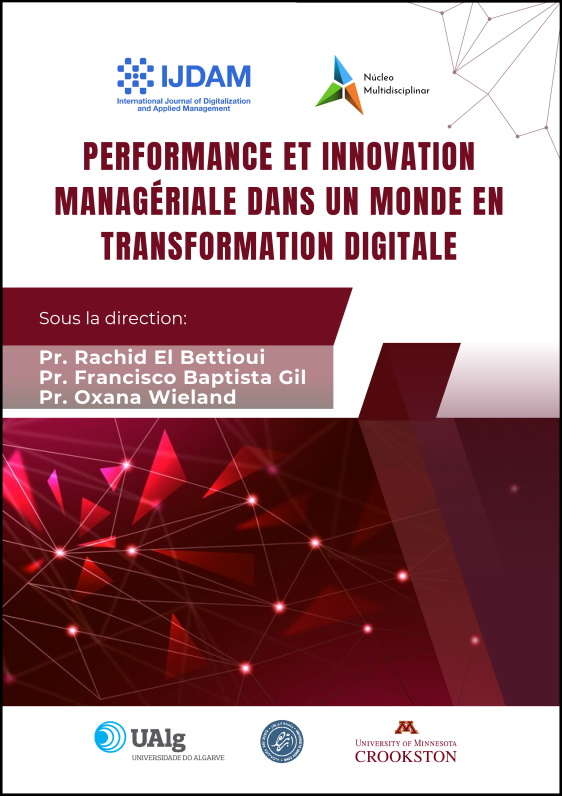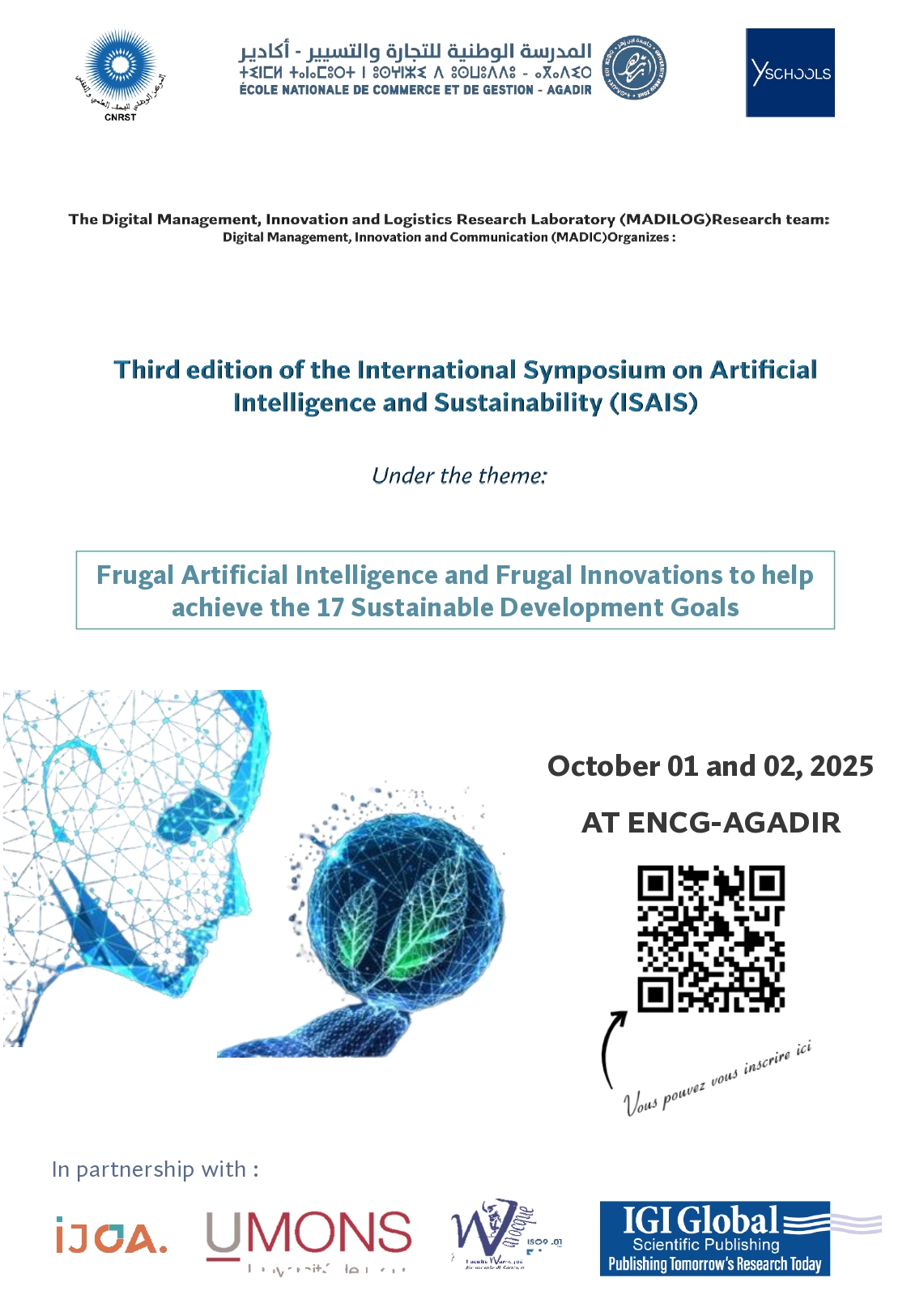Cartographie bibliométrique du crowdfunding et de l'entrepreneuriat social dans la région MENA
Analyse des cooccurrences et des co-citations
DOI :
https://doi.org/10.23882/ijdam.24161Mots-clés :
Entrepreneuriat social, Crowdfunding, région MENA, co-occurrence, analyse bibliométrique, co-citationRésumé
Cet article propose une analyse bibliométrique approfondie du crowdfunding et de l'entrepreneuriat social dans la région MENA, en s'appuyant sur l'outil VOSviewer pour explorer l'évolution de ces concepts au cours de la dernière décennie. L'objectif est de cartographier de manière exhaustive le paysage académique grâce à l'examen des données de co-occurrence et de co-citation. En exploitant les bases de données Scopus et Web of Science, nous avons analysé la littérature scientifique couvrant la période de 2015 à 2024, sélectionnant 58 documents pertinents pour cette étude. Les résultats mettent en lumière deux axes principaux structurant la recherche : les mécanismes financiers et motivationnels, ainsi que l'analyse des structures de soutien académique. L'étude identifie également des auteurs de référence tels que Mollick et Lehner, qui se distinguent par leur contribution influente au domaine. Cette recherche fournit une vision structurée et riche des contributions académiques dans la région MENA et offre un socle solide aux chercheurs et décideurs désireux de renforcer l'entrepreneuriat social par le biais du crowdfunding.
Références
Alonso, I. M. (2015). Crowdfunding in Islamic finance and microfinance : A case study of Egypt. Access to Finance and human development—Essays on zakah, Awqaf and Microfinance, 85. https://www.wijdantariq.com/wp-content/uploads/2016/05/Islamic-Finance-Book_Volume_1.pdf#page=102
Asli, A., & El Idrissi Slitine, A. (2013). L’entrepreneuriat social au Maroc, Perception et pistes de développement. Revue Marocaine de Recherche en Management et Marketing.
Aysan, A. F. F., Lemine, A. S., & Kayani, U. (2024). Kingdom of Fintech : Crowdfunding shaping the future in the kingdom of Saudi Arabia. Journal of Science and Technology Policy Management, ahead-of-print(ahead-of-print). https://doi.org/10.1108/JSTPM-05-2023-0066
Belleflamme, P., Lambert, T., & Schwienbacher, A. (2010). Crowdfunding : An Industrial Organization Perspective.
Bessière, V., & Stéphany, É. (2017). Le crowdfunding : Fondements et pratiques. De Boeck Supérieur. https://books.google.com/books?
Broadus, R. N. (1987). Toward a definition of “bibliometrics”. Scientometrics, 12(5‑6), 373‑379. https://doi.org/10.1007/BF02016680
Brown, T. E., Boon, E., & Pitt, L. F. (2017). Seeking funding in order to sell : Crowdfunding as a marketing tool. Business Horizons, 60(2), 189‑195.
Calic, G., & Mosakowski, E. (2016). Kicking Off Social Entrepreneurship : How A Sustainability Orientation Influences Crowdfunding Success. Journal of Management Studies, 53(5), 738‑767. https://doi.org/10.1111/joms.12201
Cuccurullo, C., Aria, M., & Sarto, F. (2016). Foundations and trends in performance management. A twenty-five years bibliometric analysis in business and public administration domains. Scientometrics, 108(2), 595‑611. https://doi.org/10.1007/s11192-016-1948-8
Dardour, A. (2012). Les modèles économiques en entrepreneuriat social : Proposition d’un modèle intégrateur. La Revue des Sciences de Gestion, 3, 49‑57.
Devkota, M., Singh, Y., Yigezu, Y. A., Bashour, I., Mussadek, R., & Mrabet, R. (2022). Conservation agriculture in the drylands of the Middle East and North Africa (MENA) region : Past trend, current opportunities, challenges and future outlook. Advances in agronomy, 172, 253‑305.
Donthu, N., Kumar, S., Mukherjee, D., Pandey, N., & Lim, W. M. (2021). How to conduct a bibliometric analysis : An overview and guidelines. Journal of business research, 133, 285‑296.
Janssen, F., Bacq, S., & Brouard, F. (2013). L’entrepreneuriat social : Un thème pour la recherche passée, présente et future. Revue internationale P.M.E., 25(3‑4), 17‑44. https://doi.org/10.7202/1018416ar
Kessler, M. M. (1963). Bibliographic coupling between scientific papers. American Documentation, 14(1), 10‑25. https://doi.org/10.1002/asi.5090140103
Lehner, O. M. (2013). Crowdfunding social ventures : A model and research agenda. Venture Capital, 15(4), 289‑311. https://doi.org/10.1080/13691066.2013.782624
Lehner, O. M. (2014). The formation and interplay of social capital in crowdfunded social ventures. Entrepreneurship & Regional Development, 26(5‑6), 478‑499. https://doi.org/10.1080/08985626.2014.922623
Lehner, O. M., & Nicholls, A. (2017). Social finance and crowdfunding for social enterprises : A public–private case study providing legitimacy and leverage. In Crowdfunding and Entrepreneurial Finance (p. 113‑128). Routledge. https://www.taylorfrancis.com
Majid, Y., & Neysen, N. (2017). Le crowdfunding : Quel impact sur l’entrepreneuriat social. Louvain School of Management. https://dial.uclouvain.be/downloader/downloader.php?pid=thesis%3A10308&datastream=PDF_01
Meyskens, M., & Bird, L. (2015). Crowdfunding and Value Creation. Entrepreneurship Research Journal, 5(2). https://doi.org/10.1515/erj-2015-0007
Oster, M. S., Massarsky, C. W., & Beinhacker, S. L. (2004). Generating and sustaining nonprofit earned income : A guide to successful enterprise strategies. (No Title). https://cir.nii.ac.jp/crid/1130282269480490752
Ouskou, R., Bahi, M., & Lakhlili, I. (2024). La relation entre la performance sociétale et la performance financière des entreprises. IJDAM • International Journal of Digitalization and Applied Management, 1(1), Article 1. https://doi.org/10.23882/ijdam.24079
Rostaing, H. (1996). La bibliométrie et ses techniques. Sciences de la Société; Centre de Recherche Rétrospective de Marseille. https://hal.science/hal-01579948/
Small, H. (1973). Co‐citation in the scientific literature : A new measure of the relationship between two documents. Journal of the American Society for Information Science, 24(4), 265‑269. https://doi.org/10.1002/asi.4630240406
Suárez, D. F., & Hwang, H. (2013). Resource Constraints or Cultural Conformity? Nonprofit Relationships with Businesses. VOLUNTAS: International Journal of Voluntary and Nonprofit Organizations, 24(3), 581‑605. https://doi.org/10.1007/s11266-012-9267-z
Tracey, P., & Phillips, N. (2007). The Distinctive Challenge of Educating Social Entrepreneurs : A Postscript and Rejoinder to the Special Issue on Entrepreneurship Education. Academy of Management Learning & Education, 6(2), 264‑271. https://doi.org/10.5465/amle.2007.25223465
Zahra, S. A., Gedajlovic, E., Neubaum, D. O., & Shulman, J. M. (2009). A typology of social entrepreneurs : Motives, search processes and ethical challenges. Journal of Business Venturing, 24(5), 519‑532. https://doi.org/10.1016/j.jbusvent.2008.04.007
Zahra, S., Gedajlovic, E., Neubaum, D. O., & Shulman, J. M. (2006). Social entrepreneurship : Domain, contributions and ethical dilemmas. University of Minnesota Conference on Ethics and Entrepreneurship.
Téléchargements
Publiée
Comment citer
Numéro
Rubrique
Licence
(c) Tous droits réservés Fatima Ez-zahrae Fatihi, Khadija Angade 2025

Ce travail est disponible sous licence Creative Commons Attribution - Pas d’Utilisation Commerciale 4.0 International.



 Portugal
Portugal









